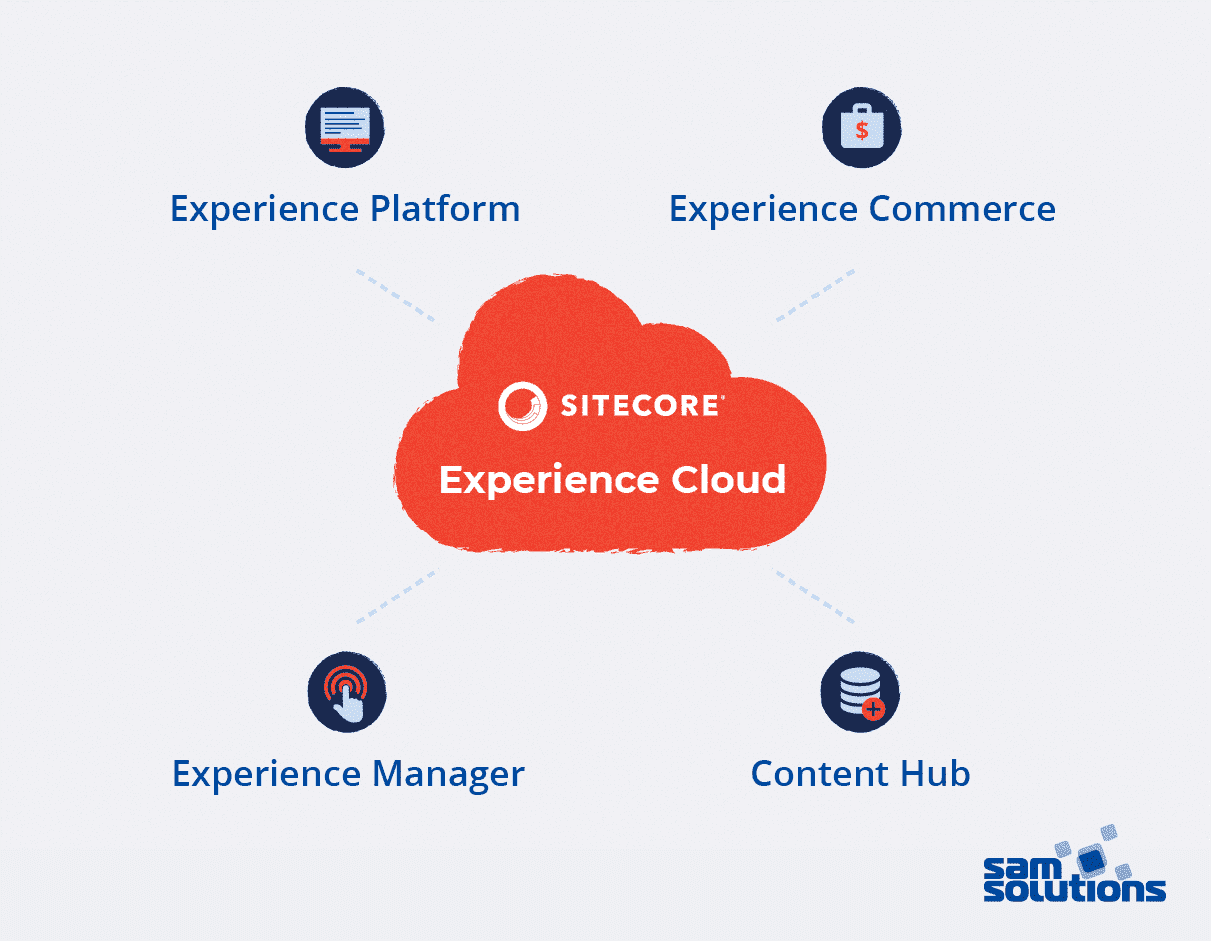I recently took part in a project based on the Umbraco CMS. This inspired me to make a comparison of Umbraco and Sitecore. In this article, I will describe these two content management systems, their similarities and differences, and will bring your attention to Umbraco’s qualities that I really liked and that Sitecore lacks. I hope it will help you figure out which solution suits your business better.
Streamline your content management and power up your digital marketing with SaM Solutions’ Umbraco services.
What Is Umbraco?
Created in 2000, Umbraco has since gotten through serious changes and enhancements, but it hasn’t evolved into an all-round solution. It’s still a simple content management solution, though well thought out and efficient.
This system is written in C# and built on Microsoft .NET. The system includes the following solutions:
- Umbraco Cloud — an Azure-based CMS
- Umbraco CMS — the free and open-source version of the CMS
- Umbraco Uno — the platform for quick and easy creation of campaign sites
- Umbraco Heartcore — headless CMS
- Umbraco Forms — the functionality for the creation of contact and sign-up forms

It doesn’t have built-in marketing and eCommerce functionality, but it can be added via integration with such services as uCommerce, uMarketingSuite, etc.
What Is Sitecore?
Since its creation in the 1990s, Sitecore CMS has successfully morphed into a powerful, versatile Sitecore Experience Cloud that has a wide range of functionalities:
- Experience Platform — the combination of a CMS and marketing automation tools
- Experience Commerce — an eCommerce system that uses content personalization and marketing automation
- Content Hub — client data storage that keeps everything in one place
- Experience Manager — a headless CMS

The system focuses on providing personalized customer experiences and relies on artificial intelligence and machine learning.
The platform is also built in C# and on Microsoft .NET, but it’s closed source.
The Benefits of Umbraco
I’d like to highlight the following benefits that I find very useful:
- The availability of a free open-source version
- Intuitive, quick and easy setup (from a single installer package) that requires little architecture planning
- A descriptive, friendly, straightforward user interface
- Ease of use and content management, although some knowledge of the content page and tree structure is required
- Rich out-of-the-box functionality and many available modules
- Functionality and architecture flexibility
- A pure CMS, with no bells and whistles (which is exactly what some businesses need)
- The availability of a cloud version
- API-based feature access
- A powerful media library
- Easy template creation
- Automatic versioning
- Minimum learning
- Little developer effort to manage ready solutions
- A helpful community and lots of documentation available
The Benefits of Sitecore
Its is not a simple CMS; it’s a holistic solution that has more than content management to offer. And I’d like to bring your attention to its benefits:
- A very wide range of out-of-the-box functionalities
- Unlimited development and configuration flexibility
- A quite straightforward development process: many things are automated, especially when using Helix and third-party utilities
- A wide variety of plugins and additional products and services
- All system components are integrated and work together seamlessly
- Automatic database and server deployment
- Advanced workflow engine, though requiring certain steps to be designed
- Smooth integration with many third-party services and systems, such as LinkedIn, Mailchimp, Salesforce, etc.
- Easy template creation, many out-of-the-box features
- Intuitive and easy to use
- Easy to scale
- Availability of a cloud version
- A huge community and 24/7 customer support that are there to help
- Abundant developer documentation
The Downsides of Umbraco
Yes, this system has some disadvantages, but these are caused by the fact that it’s straightforward and isn’t overloaded with features and capabilities. That is why its main problem, compared to Sitecore, is very limited functionality — but the vendor doesn’t make empty promises to the contrary.
With this system, you can’t scale your website as much as you need, you can’t create a multi-tenant environment, and it doesn’t have a workflow engine to optimize processes.
The Downsides of Sitecore
Although it is multifunctional and powerful, I’ve found some things that it lacks (that Umbraco has), such as:
- No image-cropping functionality
- No audit trailing with possibility to roll back (by the way, we built a similar feature at Sitecore Hackathon 2020 — a Committer Module)
- Doesn’t highlight translated items in the content tree (a very useful feature for translators)
- Requires lots of databases
- Poor versioning
Also, because of its powerful functionality, this platform is more expensive and requires more knowledge and skills, and a large developer department, to handle and support it. Also, the kickoff is more complex and takes more time.
Businesses That Benefit from Using Umbraco
Umbraco is a straightforward CMS that doesn’t promise any frills or additional functionalities. That is why I would recommend using it if you need pure content management, without eCommerce, marketing and other solutions.
This system is free and open source, which is why it’s a perfect solution for small to medium companies that can’t afford dedicated IT departments and need a website as soon as possible. Also, it will be good for businesses that need unsophisticated websites or content management solutions just to showcase their presence in the digital space.
However, as business grows, companies may need further enhancement and upscaling — and this is where they may get trapped, as Umbraco is a very limited platform.
Businesses That Benefit from Using Sitecore
This system is purposed to serve large enterprises that require more than just content management systems or simple websites. They don’t just need to be spotted; they want a solution that will help them achieve their business goals. And Sitecore provides marketing automation, eCommerce and other tools and utilities to help businesses approach their customers and engage them in the most individual way, helping them be as productive as possible.
Of course, this system may cost a bundle, especially when compared to the free Umbraco. In addition, you won’t be able to manage without a developer department as Sitecore development and further management and support takes considerable developer effort and knowledge.
Umbraco or Sitecore: Which to Choose?
Of course, this article is not a thorough comparison of these two systems, and I think that it’s wrong to say that one is better than the other. Sitecore and Umbraco belong to different weight classes in the world of content management; each of them is a brilliant example of a solution of its ‘weight.’
Sitecore is a heavyweight solution; it has more powerful functionality and is capable of almost everything, which is why it can solve and do more than Umbraco. But you shouldn’t use Sitecore if you need a quick-to-market and free system: it’s not free of charge and it is sophisticated. Umbraco is simple, fast to launch and free. Umbraco is often used by SMEs; Sitecore is an enterprise-level product, which has a lot of built-in features.
This was my first impression of Umbraco, after years of working with Sitecore. Have you had a chance to work with both platforms and how different or similar do you find them?



























 5 Reasons Why Your Business Needs a Mobile eCommerce Application
5 Reasons Why Your Business Needs a Mobile eCommerce Application Using Salesforce to Improve Your Sales Pipeline: Five Tips
Using Salesforce to Improve Your Sales Pipeline: Five Tips Cross-Platform Mobile Development: Five Best Frameworks
Cross-Platform Mobile Development: Five Best Frameworks How to Develop Custom Accounting Software
How to Develop Custom Accounting Software 10 Best Web Development Frameworks in 2024
10 Best Web Development Frameworks in 2024




![What Is Ecommerce Customer Service? [Including 8 Best Practices]](https://www.sam-solutions.com/blog/wp-content/uploads/Customer-Service-in-eCommerce.png)


![Sitecore Experience Manager Cloud (XM Cloud) [Complete Guide]](https://www.sam-solutions.com/blog/wp-content/uploads/2022/11/Sitecore-Experience-Manager-XM-Cloud.png)
![Why You Should Upgrade to Sitecore 10 [including the Sitecore 9 vs. 10 comparison]](https://www.sam-solutions.com/blog/wp-content/uploads/2022/09/Why-upgrade-to-sitecore-10.png)


![[TechSpeak] Migrating a Legacy Solution to Helix Architecture: a Step-by-Step Guide](https://www.sam-solutions.com/blog/wp-content/uploads/2021/02/Migrating-to-Sitecore-Helix-Architecture-image-1-1024x660-min.png)
 Top 30 Ecommerce Tools to Elevate Your Business in 2024
Top 30 Ecommerce Tools to Elevate Your Business in 2024 5 Best Tools to Improve Embedded Software Testing
5 Best Tools to Improve Embedded Software Testing Why React and Node.js Are the Top Technologies for Creating High-Performance Web Apps in 2024
Why React and Node.js Are the Top Technologies for Creating High-Performance Web Apps in 2024 10 Best IoT Platforms for 2024
10 Best IoT Platforms for 2024
I loved reading this article! For someone like me who is interested Umbraco and Sitecore, I’m glad to see that people like you exist. Keep it up and good luck!
It was very easy to read through your blog and understand easily. Now I’ll go share it with my friends, who asked me about Sitecore and Umbraco!
Very nice blog, Thanks for sharing the excellent post. You are providing incredible information; it is very useful to us. Keep posting such a great posts in future as well.
Cool post! thanks for sharing. Now I know more about Umbraco and Sitecore Content Management System.
Sitecore is my number one! I’ve been knowing it for more than 9 years now, and I can assure you: websites that it allows creating are just marvelous, they are one of the kind. Not sure Umbraco is capable of this.
For 5 years, I have been working with Umbraco, and it’s the first and only CMS I know. And I just love it! So simple, so quick, so descriptive…. And still allows to create brilliant websites.
Thanks dude! Never had a chance to try any of them, but I hope I will some day as you describe them so temptingly.
I’m a Umbraco developer and had once done with Sitecore (quite the opposite). And you know, I have the same feelings and impression as you do! Umbraco is so straightforward and efficient, and Sitecore is so full of wacky things and allows you to do a lot of things!
Thanks for the post! I work with Umbraco, and now I’m looking forward to dipping my toes into Sitecore. I hope it won’t be disappointing.